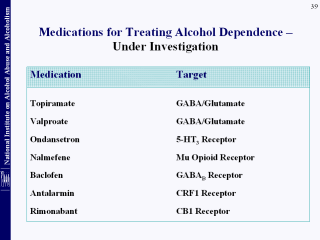Search for most updated materials ↑
| front |1 |2 |3 |4 |5 |6 |7 |8 |9 |10 |11 |12 |13 |14 |15 |16 |17 |18 |19 |20 |21 |22 |23 |24 |25 |26 |27 |28 | 29 |30 |31 |32 |33 |34 |35 |36 |37 |38 |39|40 |41 |42 |review |
 |
New medications that provide
effective therapy to a broader spectrum of alcoholic individuals
would be of value for the treatment of alcohol dependence. Research
findings revealing that drinking and alcohol-seeking behavior are
influenced by multiple neurotransmitter systems, neuromodulators,
hormones, and intracellular networks provides evidence that there
are a number of potential target sites for which new pharmaceuticals
may be developed. Potential target sites include neurotransmitter
systems related to opioids, serotonin, dopamine, glutamate,
gamma-aminobutyric acid (GABA), cannabinoids, the
hypothalamic-pituitary-adrenal (HPA) axis, adenosine, neuropeptide
systems (for example, neuropeptide Y, corticotrophin releasing
factor), signal transduction pathways (such as, protein kinase A and
protein kinase C); and gene transcription factors (delta fos B and
cAMP response element-binding protein [CREB]). Indeed, many such
agents are under investigation.
|